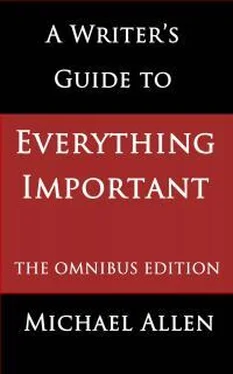Just to give you an idea of the scale upon which a big-time agent operates, Wylie’s agency now handles more than 700 clients. These include, as you would expect, some seriously big names, such as Al Gore and Elmore Leonard, but also the estates of some major literary figures, such as Saul Bellow and Norman Mailer. The estates of dead writers can still generate huge sums of money.
By the way, if you are thinking that Andrew Wylie sounds like just the chap to represent you, let me warn you that you are right out of luck. The Wylie Agency web site has a page headed Submissions, and at the time of writing it reads as follows:
‘The Wylie Agency does not currently accept unsolicited submissions. So eff off.’
Actually I invited the second sentence, but you get the general idea. If Mr Wylie’s web site does not convince you that the agent is now the man in charge, then I don’t know what will.
In modern publishing, writers are mere nobodies: they are just the mugs, suckers, and fuzzy thinkers who work for years, in return for no money at all, in the hope that one day (if only because of the law of averages) an agent somewhere will decide that they have talent, and that after that everything will go smoothly until, in a very short time, the writer ends up as famous as… fill in name of choice.
Good luck with that idea.
2.4 The position at the end of the twentieth century
As the twentieth century progressed, the numbers of agents increased. For a certain sort of person – perhaps someone with a few years of experience in publishing, or even in an agent’s office – the prospect of setting up in business as an independent agent was an attractive one. By the year 2000 there were 161 agents in the UK. Of these, 37% had been set up since 1990.
By the end of the century, the relationship between writers, agents, and publishers was pretty well defined.
It was hard, though not impossible, for a writer to get anywhere without an agent to help her.
Publishers had merged and merged again to the point where there were now only six major markets for writers and agents to aim for; there are now five, following the merger of Penguin and Random House in 2013. (For further details of this merger mania, see my earlier ebook, A Writer’s Guide to Traditional Publishing. )
Agents had done a bit of merging too. It dawned on people that if 15 agents, each with one or two big names on their books, rolled themselves into one firm, then the Big Six publishers would have to take that new agency a bit more seriously than they took the little guys. Better terms would be negotiable. Or at any rate, bigger money.
Speaking of money, it was in the 1980s that the general practice of charging clients a basic commission of 10% was shifted markedly upwards to 15%.
Once again, it is interesting – but probably futile – to speculate as to how this came about. We have already noted that if there was deliberate collusion to fix a price, this would probably be an illegal act. So it was not the case, one assumes, that the various bodies representing agents collectively (of which more in a moment) sat around discussing the issue in formal session, and passed a motion, recorded in the minutes, that as from next Tuesday the basic commission rate would go up from 10% to 15%. Dear me no.
No, it is much more likely that things were done in the same way that the leader of the UK Conservative Party used to be ‘selected’. What happened was that a few senior chaps got together, had a few drinks, kicked the can around a bit, and then they each went out and talked to a few other chaps, and got a general, sort of, you know, feeling for the general atmosphere. After which, in the case of the Conservatives, the name of the future leader would sort of… emerge. Nothing so vulgar as an election.
So, somewhere in the 1980s, a general sort of, you know, feeling kind of… emerged among agents. The feeling was that life would be a could deal more comfortable if writers were paying a lot more for the agents’ services than they had been so far.
Then, over a period of a few months or so, the leading agencies upped their rates; and the smaller agencies said to themselves, Well, if they need the extra 5% to function effectively, we certainly do. And so forth.
You will have noticed, perhaps, that it seems so much more tactful to refer to the increase as ‘an extra 5%’ rather than a 50% increase on the earlier rate, which is what it was.
For the benefit of any newbies, perhaps it needs to be pointed out that the 15% would be charged as the rate on book contracts in the home market. Higher rates would apply if, for instance, the UK rights were sold by a UK agent, acting on behalf of the US agent, or vice versa. And higher rates would often apply to film rights, which might involve paying commission to a Hollywood-based specialist.
None of which means, to be fair, that the client was necessarily being ripped off. Far from it. Sometimes an agent’s skills are worth a lot of money.
Sterling Lord quotes a case of an agent meeting a film producer. The producer opened proceedings by stating that he was willing to offer $100,000 for the film rights. The agent, slightly stunned perhaps, said nothing. And then, after a nervous silent pause, the producer promptly doubled his initial offer.
Before we leave the subject of commission, perhaps it is worth noting that the question of a basic rate of 20% is now being talked of in some quarters. For a discussion of this kind of issue, see the Writer Beware pages of the SWFA (Science Fiction and Fantasy Writers of America). These pages are in fact absolutely essential for anyone contemplating a search for an agent.
For several decades, agents in both the UK and the US (and probably in many other countries too) have established various ‘professional’ societies or associations. These give the agency business an air of respectability. Or at least, that was the intention.
In the UK, there is the Association of Authors’ Agents. This body’s web site provides a code of practice, a members directory, and various other bits and pieces. About 100 firms are listed as members.
In the US, the equivalent body is the Association of Authors’ Representatives, which has 400 members. The AAR’s web site is somewhat more informative than the AAA’s.
At the time of writing, a search of the two web sites reveals that neither body has much to say about the commission charged by members. That is presumably left for each individual firm to discuss with a potential client. But don’t expect any cut-price offers.
Finally, and perhaps most importantly, you need to be aware that, in most agencies, the end of the century had witnessed a passing of the handshake deal forming the contract between agent and writer. Because a contract is that is what it always was, in law, even if it was not written down.
In the 1980s, the practice arose of asking writers to sign an agency agreement. Some writers probably signed this without thinking very hard. After all, what was the alternative? Offending the agent? Unthinkable! But it would always have been wise, and today it is absolutely essential, to take a very close look at the small print of such an agreement.
It is not unknown for them to contain clauses such as ‘You may not write in any other genre for at least three years.’ And you might very well want to.
Most agents are honest, but in today’s market all are hard-pressed, and the need to survive financially may come to outweigh considerations of friendship. On close examination the provisions of the agent/writer agreement may be seen to have some sharp edges. You have been warned.
PART 3: Disagreements and disputes
When money is involved, it is often the case that even families fall out among themselves, so it will hardly come as a surprise to be told that disputes between agents and their clients can be bitter and protracted.
Читать дальше












